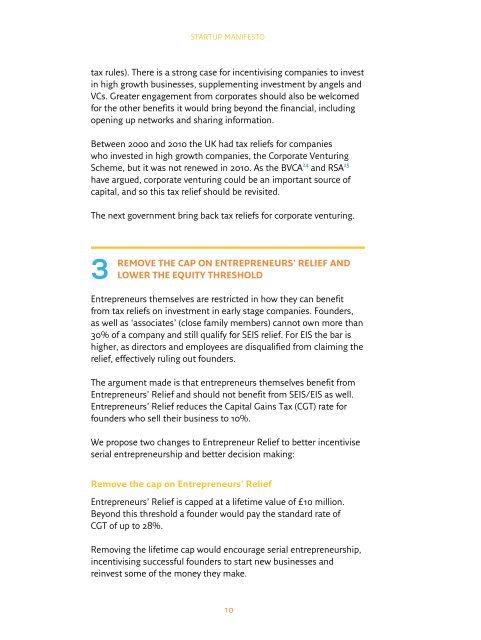Startup-Manifesto
Startup-Manifesto
Startup-Manifesto
You also want an ePaper? Increase the reach of your titles
YUMPU automatically turns print PDFs into web optimized ePapers that Google loves.
STARTUP MANIFESTO<br />
tax rules). There is a strong case for incentivising companies to invest<br />
in high growth businesses, supplementing investment by angels and<br />
VCs. Greater engagement from corporates should also be welcomed<br />
for the other benefits it would bring beyond the financial, including<br />
opening up networks and sharing information.<br />
Between 2000 and 2010 the UK had tax reliefs for companies<br />
who invested in high growth companies, the Corporate Venturing<br />
Scheme, but it was not renewed in 2010. As the BVCA 24 and RSA 25<br />
have argued, corporate venturing could be an important source of<br />
capital, and so this tax relief should be revisited.<br />
The next government bring back tax reliefs for corporate venturing.<br />
3<br />
REMOVE THE CAP ON ENTREPRENEURS’ RELIEF AND<br />
LOWER THE EQUITY THRESHOLD<br />
Entrepreneurs themselves are restricted in how they can benefit<br />
from tax reliefs on investment in early stage companies. Founders,<br />
as well as ‘associates’ (close family members) cannot own more than<br />
30% of a company and still qualify for SEIS relief. For EIS the bar is<br />
higher, as directors and employees are disqualified from claiming the<br />
relief, effectively ruling out founders.<br />
The argument made is that entrepreneurs themselves benefit from<br />
Entrepreneurs’ Relief and should not benefit from SEIS/EIS as well.<br />
Entrepreneurs’ Relief reduces the Capital Gains Tax (CGT) rate for<br />
founders who sell their business to 10%.<br />
We propose two changes to Entrepreneur Relief to better incentivise<br />
serial entrepreneurship and better decision making:<br />
Remove the cap on Entrepreneurs’ Relief<br />
Entrepreneurs’ Relief is capped at a lifetime value of £10 million.<br />
Beyond this threshold a founder would pay the standard rate of<br />
CGT of up to 28%.<br />
Removing the lifetime cap would encourage serial entrepreneurship,<br />
incentivising successful founders to start new businesses and<br />
reinvest some of the money they make.<br />
10


